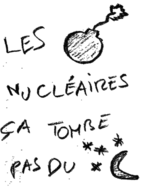Camp
Before coming to Rayonnantes, it would help us if you could fill in the anonymous pre-registration form (in english)!
On the model of the “shape the camp” of the Climate Justice Camp in Belgium we have set up chosen mixity (i.e. between people affected by the same oppression) to think about different aspects of the camp. You can find all these productions in the tab sytemic struggles.
General information
The location
The camp will take place on the site of the old station of Luméville (6 km from Bure), which is a private place bought by opponents of the Cigéo project a few years ago – a symbolic place because it is threatened in the long term because it is on the railway line.
Kitchen – Food – Dumpster diving
The food will be vegan. If you have any food allergies, tell us in the form and we will take into account as much as possible.
For political reasons, most of the collective spaces on the camp will be vegan – without animal products (dessert, self-service kitchen, kitchen). For the dining area, you can eat what you want while keeping the vigilance to ask around if it bothers you to take out non-vegan products.
There will be a self-service cooking area in parallel to the canteen. Avoid arriving with fresh produce (vegetables, meats).
On the one hand, there will be no space for cooking animal products, and on the other hand, we will not mix vegetables from recups with vegetables from the camp supplies – recups will be more of a clutter than anything else.
Any dumpster diving treasures of products of the “disgulicious” kind (industrial cookies, spreads, brioche, …) is welcome ! In the breakfast area, there will also be a vegetarian area for dumpster diving products that are not vegan. It will be possible to store what will be brought back.
Sleeping
For sleeping, if you can, it would be great if you could bring a tent and a sleeping bag or a sheet and a blanket. If it’s difficult for you, tell us and we’ll find a solution together (sleeping in indoor sleeping, room for person with a disability, other needs).
Pay what you want
The camp will operate based on pay-what-you-want (entries, food, shuttles documentation, soft drinks, etc.). Pay what you want, it means that you give what we want, what we can, the camp will be partly financed by external funding.
On the camp information will be given on what it cost us.
Alcohol, cigarettes and drugs
The refreshment area will sell alcohol at specific times. To ensure an environment in which everyone can feel comfortable, alcohol and drug free areas are provided on the camp.
With the intention of not encouraging alcohol consumption, there will also be a non-alcoholic refreshment area and opaque containers. We ask that you do not come to the discussions and workshops if you are feeling drunk or high. We also want the camp to be a smoke, ash and cigarette butt free place, but there will be a smoking area!
Non-human animals
We have not planned specific welcome for non-human animals on the camp.
We want the young children to be as free as possible, and we fear a difficult cohabitation.
We therefore ask you not to come with non-human animals.
If this is really not possible for you, you will have to take care that their presence does not frighten, or is not a danger for kids and adults.
Kids space
On the camp, there will be a space dedicated to young people so that they can meet, rest, play and any other activity they can invent. It will be a tent with mattresses, cushions, artistic material and a library with nice books. The idea is that this place will be open non-stop to young people so that they can make it their own and shape it as they wish. “Adult” people will be able to pass through but with the approval of the young people present and respecting their use of the space.
There will be set time slots for “adult” people to sign up if they wish to accompany the younger people present to co-construct activities, play, explore the camp and its workshops, and spend time together.
All the workshops that will take place at the camp will be open to young people with guidance if needed. For example, there will be the possibility to make a camp newspaper/fanzine, to make a radio program and a thousand other things that we don’t think of. We will be able to organize big games and shows/events according to the desires. We will discuss with young people beforehand to ask their opinion on the construction of this space.
If you have any questions/information/suggestions do not hesitate to write to “lescopainesdelest@riseup.net”
You are also welcome to bring your own board games/books/art materials
Journalists and photos
On the camp, it is forbidden to take photos or videos. In recent years, there has been a strong police and judicial presence and repression around Bure. The idea is to feed it as little as possible, for example by not making it easier to identify people in the camp.
However, it is important for us that this event and this struggle is documented and that it radiates beyond the space-time of the camp. That’s why we’re going to do some self-media (if you want to help us, welcome!) and we’re making links with the media. What we plan is that several people take pictures of the camp. These people will be identified and will not take pictures of faces. If we think that some faces, even from a distance, can be recognised, they will be blurred. We would also like to welcome some journalists to the camp. If this takes place, it will be for a set period of time, which will be announced publicly. Journalists will be identified, accompanied and will not take photos.
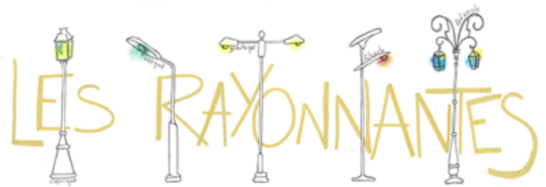
Guidelines
Not translated yet.
How to get there?
It is located on the road D138, between Mandres-en-Barrois and Luméville-en-Ornois.
GPS coordinates : 48.471426,5.418187
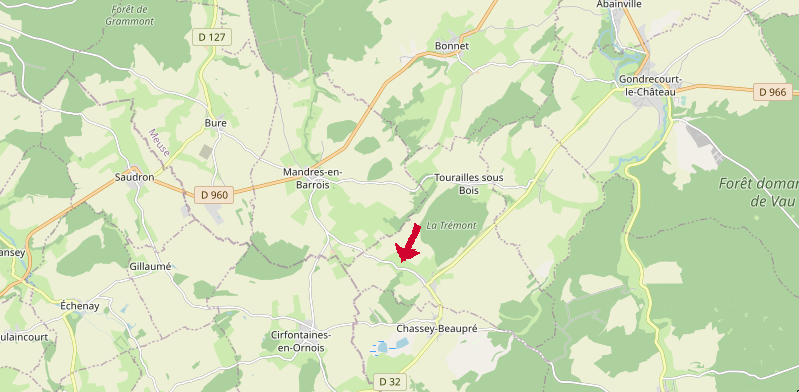
If you come by car!
A pad exists for happy carpoolers – to access it, just register for the event!
If you come by train!
A shuttle system will be set up, the phone number of the shuttle is (+33) 07.73.44.17.11. It’s great if you let us know in advance when and where you want to be picked up.
Several arrival options:
– by Bar-Le-Duc, you can then take the bus Line 18 to Gondrecourt-Le-Château. This is the closest to pick you up.
You can find the bus timetable on the Fluo website, putting in destination Gondrecourt.
– again via Bar-Le-Duc, you can also take the bus Line 1 to Ligny-en-Barrois. It’s a bit further, but the bus frequency is better.
– you can also arrive at Joinville station
If you come by hitchhiking !
We can advise you to aim for Thonances-les-Joinville or Ligny-en-barrois, these are roads where friends who come by car are likely to pass, and therefore easier to pick you up!
And if you are a driving enthusiast!
For the duration of the camp, the shuttle will be self-managed! Don’t hesitate, to go and pick up your friends but also to make nice car rides in Meusian and Haut-Marnais regions!
Accessibility and amenities
The Rayonnantes camp will take place in an isolated area (first shops, tobacco shop and pharmacy) 15km away. Access to drinking water and electricity will be provided but limited. The camp will be held outdoors, with some covered areas. Some parts of the camp, which do not concern the majority of the workshops and daily life of the camp, will only be accessible by steep stairs with railings.
The ground of the camp is not very flat, it is mostly earth or grass, with many stones, holes, mud puddles depending on the weather, as well as some sloping passages. There are ongoing construction projects and we are doing our best to make the ground more or less flat for access to the main areas of the camp, but we cannot guarantee autonomy for people who wish to come in a wheelchair.
There will be a wheelchair-accessible toilet block and a person with a disabilty campsite with mattresses in the tents, which will be more accessible than the other campsites. It will be possible to sleep (and shower) in the surrounding community houses, by specifying this need in the registration form.
Parking will be available and close to the camp for those who need it.
There are several quiet spaces for people who want to isolate themselves from the camp, where there will be no interaction between people. These spaces will be available primarily for neuro-atypical people.
The team organising the parties has been asked not to have any flashes of light, especially during the parties, which may be loud. There will be traffic jams in the areas without interaction and we are also trying to get headphones together.
Spaces in chosen mixity
Areas in different mixities have been chosen for the camp: It is planned to have a rest area in chosen mixity for racialiazed persons (without white persons), a MINT camping: Women, Intersex, Non-binary, Transgender (without cisgender man* with toilets and a chill area and a rest space in queer chosen mixity open to people in questionning process.
We decided to set up these spaces in a chosen mix (between people affected by the same oppression) to allow people who suffer from systemic oppression to rest, to find strength together, to be able to share the daily micro aggressions, to be able to do something about them, to discuss them or laugh about them and to make them public and political, not to have to keep it to themselves
For us there is no such thing as a “safe” space that’s why they won’t be described as such or thought of as such. We prefer the idea that there are benevolent spaces (the chosen mixed spaces) and confrontational spaces (we will do our best to make the rest of the camp so).
Other spaces will also be set up such as a children’s space, which will allow the adults referring the child(ren) on the camp to be able to participate in workshops and the children not to be bored. There will also be a quiet space without interaction to allow for rest, because we know that being on a camp with many children can be exhausting.
* for us « cisgender » means persons whose gender identity matches their sex assigned at birth
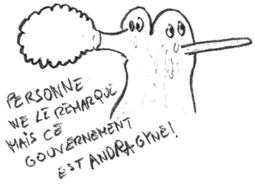
Protocol in case of aggression
Emergency group in case of aggression
An emergency group in case of a violent situation requiring emotional support (for example an assault) was formed during the setting up of the camp. This group exists to be able to be reactive to an assault situation by preparing some available resources and to not leave the emotional burden of support unseen and in the hands of only FLINT people (Female, Lesbian, Intersex, Non-binary, Trans).
We have thought about how to find a safe place for the abused person, how to tell the camp that an abuse has occurred with the consent of the abused person, and we have selected resources to support the abused. If you would like to join this group so that the burden of emotional support does not fall solely on the people who have thought about the camp beforehand, ask the people in the info tent who will direct you.
If you witness an assault or wish to contact the emergency group, you can :
- call the listening team’s number : 07 55 95 56 24
- or talk about it at the info tent
- or talk to the evening team
- or talk to the (r)evolutionary group
Lexicon
We differentiate conflict from aggression or situations of violence. Conflict for us is between several people who are on equal footing or who do not use their privileges when expressing disagreements. There is therefore the possibility of a fair dialogue between them. In contrast, aggression is one-sided. One person determines the beginning and the end at the expense of the other. The reality is obviously often much less clear-cut, but we feel it is important to point out that we are not here to resolve all interpersonal conflicts on the camp.
Person assaulted: Rather than referring to a victim, we prefer to use the term “person assaulted.” We choose these expression in order not to freeze people in roles and reduce the complexity of a person to the fact that he or she has been assaulted.
We will use the term assault management to refer to anything that can be done to help after an assault: support for the assaulted person, accompaniment of the assailant, debriefing in the face of the collective, etc.
A distinction is made between support of the abused person and accompaniment of the abuser. Support consists of helping the abused person in a process of care, if he or she so desires. Accompaniment seeks to offer the abused person a process of reparation and personal change.
UPSTREAM ORGANIZATION
-
Selection of resources available in the infokiosks
The resources that have been selected are the following fanzines, which will be available on site:
-
- Day by day, violence between loved ones which contains many resources on how to support someone who has been assaulted,
- Supporting a sexual assault survivor which details some basic principles for supporting a sexual assault survivor
- A care protocol written for the camp of the 2020 summer. This protocol details practical things to do according to temporalities after the assault (right after the assault, on the short term, on the medium and long term).
-
Preparation of safe places for the person being assaulted
-
The announcement at the camp
It seems important to us to have thought beforehand about the means that can be used to announce that an aggression has taken place on the camp and to reserve the possibility of pausing the camp in order to begin a collective reflection on this subject. The announcement at the camp is also a way to allow people with skills on emotional support to join the emergency group.
The general idea is also to offload the burden of caring for the assault from the whole camp to a group of people in the camp who volunteer to help and have skills. The public announcements then provide a link between the care group and the rest of the camp so that the responsibility does not rest solely on the shoulders of the care group and that collective work on the camp can be done if it is relevant. Publicly identifying oneself as the group in charge of the assault also helps to avoid too many uncoordinated individual initiatives that can have a negative impact on the support of those involved.
IN CASE OF AGGRESSION, THE FIRST 24-28 HOURS BEFORE THE ANNOUNCEMENT TO THE CAMP
-
Welcoming the assaulted person
The emergency group puts in place the first steps to support the assaulted person and accompany the aggressor. For the assaulted person, the focus will be on listening to the needs expressed and responding to them as best as possible. The care protocols can be consulted for more details on these first days. It will also be important to gather as much information as possible about the assault, including the accounts of the person assaulted and of any witnesses.
-
Accompanying the aggressor
Immediately after learning that an assault has taken place, the people in the emergency group will try, as much as possible, to behave in a neutral manner. It would not be wise to react on the spot with emotion, without collective reflection and with incomplete information. The priorities at this time are to take care of all the people, whether they are aggressors, witnesses or victims, and to collect their stories. The emergency group will also take care to avoid a new aggression (recidivism or settling of accounts). This can be done, depending on the case, by monitoring the aggressor or by isolating him or her while determining how to proceed collectively.
-
Contacting relatives :
The family members of those involved in the violent situation are contacted by the emergency group to obtain information and determine if they are willing to get involved in the management of the assault. The crisis group may also share resources with the family members of those involved.
AFTER THE CAMP ANNOUNCEMENT
-
Support and accompaniment
Depending on the situation, available resources will assist the emergency group in supporting the assaulted person and accompanying the aggressor.
-
Limited duration of support
The emergency group cannot make a long-term commitment to support the abused person. The hotline for the emergency group will be open until September 15. The group will try to refer those involved and their loved ones to outside support groups.
-
Assistance in the return of the assaulted person
Depending on the requests of the assaulted person, the emergency group will be able to help the assaulted person return to a place where they feel comfortable during camp or after camp.
-
Integration of new people in the support and accompaniment
People who feel available and have support skills can volunteer to assist or join the emergency group.
-
Regular debriefings
In order to feed the collective reflection and to support each other, the emergency group meets regularly in the absence of the assaulted and aggressor persons.
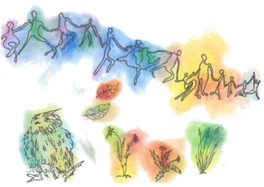
Covid
The circulation of COVID is still active in many parts of the world, including France. If you think you may have been exposed to the virus and want to come to camp with more confidence, you can have an antigen test done at the pharmacy or make an appointment for a PCR test (these tests are free if you have a health french card). If you are not vaccinated, please get tested before coming! If you are positive for COVID, we are sorry but we have to ask you not to come to the camp :( we hope you will recover quickly, take care of yourself!
For information, several measures will be put in place:
- Hydro-alcohol gel and masks will be available at the entrance and inside the camp, especially in the reception area, kitchen area, meal service areas, other enclosed areas and toilets
- A COVID protocol for the kitchen will also be put in place
- People running workshops in closed spaces will always ask people if they want to wear the mask
- In the event of a confirmed Covid, a protocol will be put in place by the medical team.
Coming from elsewhere in France : how to
If you come by car!
A pad exists for carpoolers – to access it, just register for the event!
If you come by train!
A shuttle system will be set up, with a phone number that will be made available. It’s nice if you give us notice early enough on this number, what time and where you would like to be picked up.
There are several arrival options:
– via Bar-Le-Duc, you can then take the bus Line 18 to Gondrecourt-Le-Château. This is the closest bus to pick you up.
You can find the bus schedule on the Fluo website, by setting the destination as Gondrecourt.
– Still via Bar-Le-Duc, you can also take the bus Line 1 to Ligny-en-Barrois. It’s a bit further even if it’s already close, but the bus frequency is better.
– you can also arrive at Joinville train station
If you come by hitchhiking !
We can advise you to aim for Thonances-les-Joinville or Ligny-en-barrois, these are the places where friends who come by car are likely to pass by, and therefore easier to pick you up !
And if you are amateur of the driving!
During the whole camp, the shuttle will be self-managed! Don’t hesitate, to go and pick up your friends but also to make nice car rides in Meusian and Haut-Marnais regions !
Translated with www.DeepL.com/Translator (free version)
Coming from abroad
Hello, it’s great that you’re coming! There will be interpreters on the camp to help as many people as possible to come. If you are planning to cross the borders and you risk being controlled, here is some information that may be useful to you (state of the sanitary measures to come to France, updated on 30/06/2021):
From 1 July 2021, the health pass will be recognised for travel within the European area, in the form of a European certificate. The certificate will be able to include :
- proof of vaccination, i.e. a document certifying that :
-
you received your 2nd injection at least 2 weeks ago for double injection vaccines (Pfizer, Moderna, AstraZeneca),
-
you have received your injection at least 4 weeks ago for single shot vaccines (Johnson & Johnson);
-
- a negative test result
- proof of recovery from Covid of less than 6 months
Measures for return are those of the country of destination.
If you are from the European Union or a “green list” country (Australia, South Korea, Israel, Japan, Lebanon, New Zealand or Singapore)
- If you have been vaccinated: you will need to show proof of vaccination.
- If you are not vaccinated: you will need to present a negative PCR or negativ antigen test less than 72 hours old.
/ ! \ The case of the United Kingdom
Since 31 May, a reinforcement of sanitary measures has been decided for travellers going to France from the United Kingdom, in view of the development of the so-called “Indian variant”:
- Compelling reasons will be required for non-EU foreign nationals not resident in France to join France from the UK;
- a negativ PCR or antigen test less than 48 hours old will be required of anyone entering France from the UK;
- on arrival, travellers will be required to observe a 7-day period of self-isolation. For the time being, due to the low incidence of Covid in the UK, the routine home control scheme will not be applied to them.
